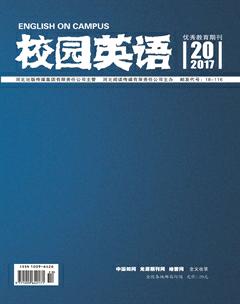A Brief Analysis on Three Common Grammatical Errors of Chinglish
朱加強
【Abstract】The pace of Open and Reform moves deeply in China, which furthermore pushes China into the international world in all aspects of society. The increasing connection between China and the rest of parts worldwide makes it possible for the language of Chinese to own an opportunity to communicate with other languages in different cultural backgrounds; in other words, the multilingual collision is generated as a result of globalization. This paper presents an overview on three common grammatical features of Chinglish from the study in recent years.
【Key words】Multilingual Collision; Chinglish; Grammatical Features
1. Introduction
“Chinglish”, also called “China English”, refers that English language learners in China shaped by Chinese culture and Chinese thinking pattern always apply Chinese grammar into English, which in the final leads to the barbarism. Joan Pinkham defined Chinglish as a misshapen, hybrid language that is neither English nor Chinese but that might be described as ‘English with Chinese characteristics. In the following, this paper presents three commonly grammatical features of Chinglish.
2. Grammatical Features of Chinglish
2.1 Disordered Sequence in Sentence
The way of translating word by word is undesirable, but this phenomenon can be easily found in Chinglish among Chinese learners. Taking the grammar and habit of English to reorder the sentence sequence is the key to avoiding barbarism. For example:
He decides tomorrow to go there.
In this sentence, “tomorrow” is put in the middle, which is unfit for English expression. Generally speaking, time adverbial is always put in the first or last place in sentence. Therefore, the corrected one is:
He decides to go there tomorrow.
Besides, Chinese sentence is inclined to use the order of pronouns from “I” to “you”, but English is just the opposite. For example:
I still remember everything that happened to me and her.
After correction, the sentence is:
I still remember everything that happened to her and me.
2.2 Improper Usage of Verb
Verb has three basic kinds of tense: past tense, present tense and future tense. And it has two kinds of voice: active voice and passive voice. Because of the influence of speaking and using Chinese, there are a lot of incongruities towards tense and voice in Chinglish. For example:
That book is his cousin gives him.
From the habit of speaking Chinese, if active voice and passive voice is not confused and clear in mind, then it is unnecessary to point out the performer of the action, and passive voice will not be used in the sentence. Thus the corrected translation of “那本書是他堂哥贈送給他的” is:
That book is given to him by his uncle.
2.3 Lengthy Words of Repetition
One obvious difference between English and Chinese is that English is less likely to use repetition. If there is in need of several repeated words, then pronoun can be replaced or used in other ways to avoid this phenomenon. For example:
In order to promote the development of Sino-Japanese relations, China is in need of knowing Japan better and Japan is in need of knowing China better.
The sentence can be corrected as:
In order to promote the development of Sino-Japanese relations, China is in need of knowing Japan better and vice verse.
The phrase “vice verse” is always be used to replace some repeated part in the sentence. With the influence of Chinese syntactical structure, Chinese learners tend to use long single series of sentences, even their structures are the same ones. For example:
It is essential for students to know the world outside the campus. Because our society is developing quickly.
This sentence can be corrected as:
With the quick development of our society, it is essential for students to know the world outside the campus.
3. Conclusion
Its not acceptable to treat Chinglish with blind exclusion because of its unsuitable usages, but the way of translating word by word and ignoring English grammar are either unreasonable. However, Chinglish will own the prospect and get more and more admiration when the efforts of correction and improvement are made into it. As to the prospect of Chinglish, Zheng Youmin thinks that the change of language can be guided rather than prohibited. Chinas fast economic growth and Chinese passion to the international affairs will promote Chinglish as well.
References:
[1]牟之渝.網絡中式英語的特征及其成因[J].重慶工商大學學報(社會科學版),2011(5).
[2]汪紅霞.淺談中式英語[J].科教導刊(電子版),2013,(21).
[3]鄭佑民.讓“day day up”們來得更猛烈些吧[J].海外英語,2009,(11).

